Digital Business Roadmap: New Technologies & Business - BM565 Report
VerifiedAdded on 2023/06/12
|9
|2985
|464
Report
AI Summary
This report provides a comprehensive overview of the digital business roadmap for new businesses, emphasizing the importance of adopting new technologies to enhance customer experience and reinvent business models. It discusses the critical role of digital technology in today's business environment, highlighting how it enables new organizations to enter markets, expand their brand reach, and form new partnerships. The report details specific technologies such as cloud computing, social media management, and accounting software, and how these tools are used effectively by businesses. It also examines the relationship between digital technologies and established business theories, including decision-making theory, quantitative theory, system theory, and contingency theory, as well as e-commerce business models like B2C, C2B, and B2B. The analysis demonstrates how digital transformation impacts decision-making, efficiency, and customer engagement, ultimately driving business growth and success.
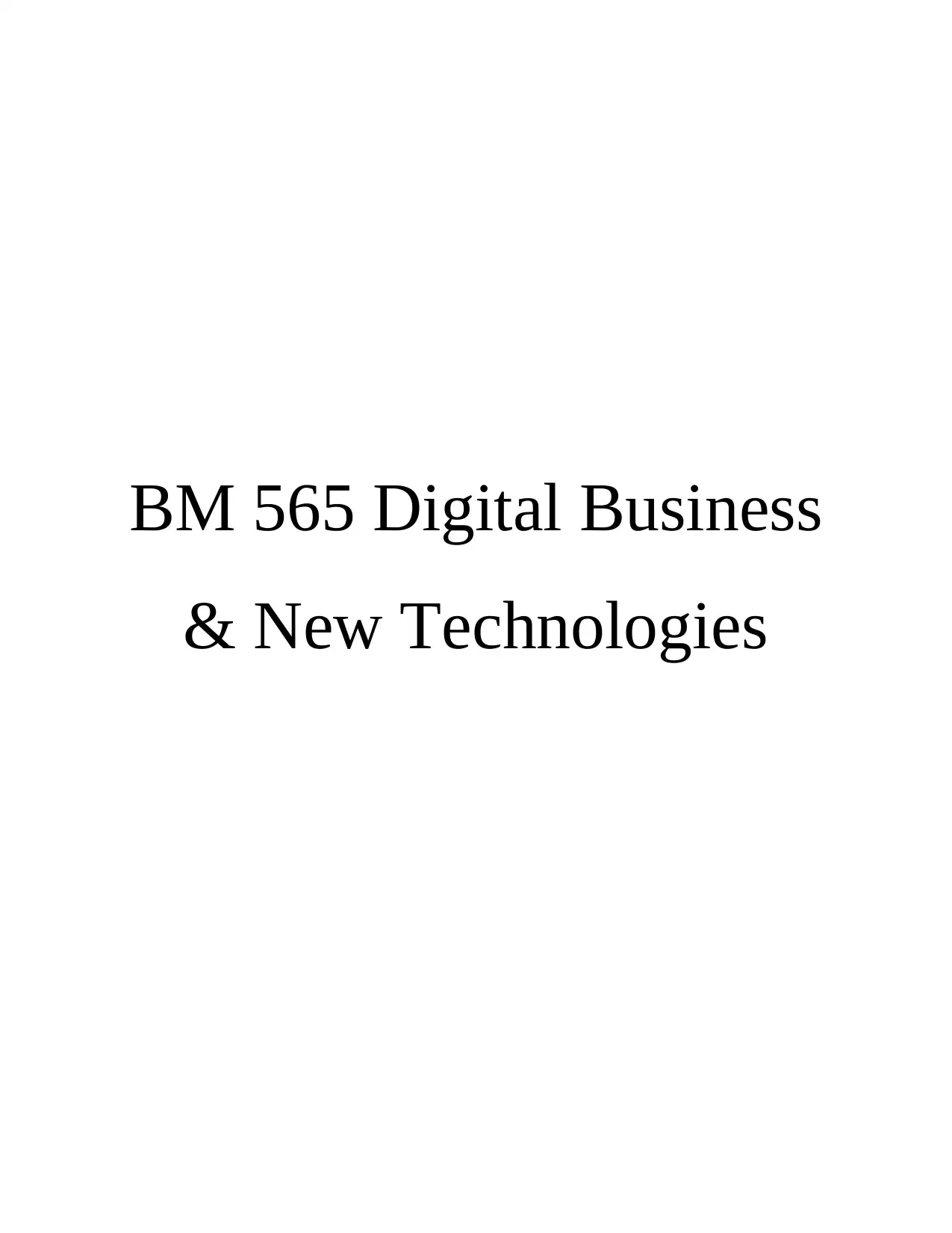
BM 565 Digital Business
& New Technologies
& New Technologies
Paraphrase This Document
Need a fresh take? Get an instant paraphrase of this document with our AI Paraphraser
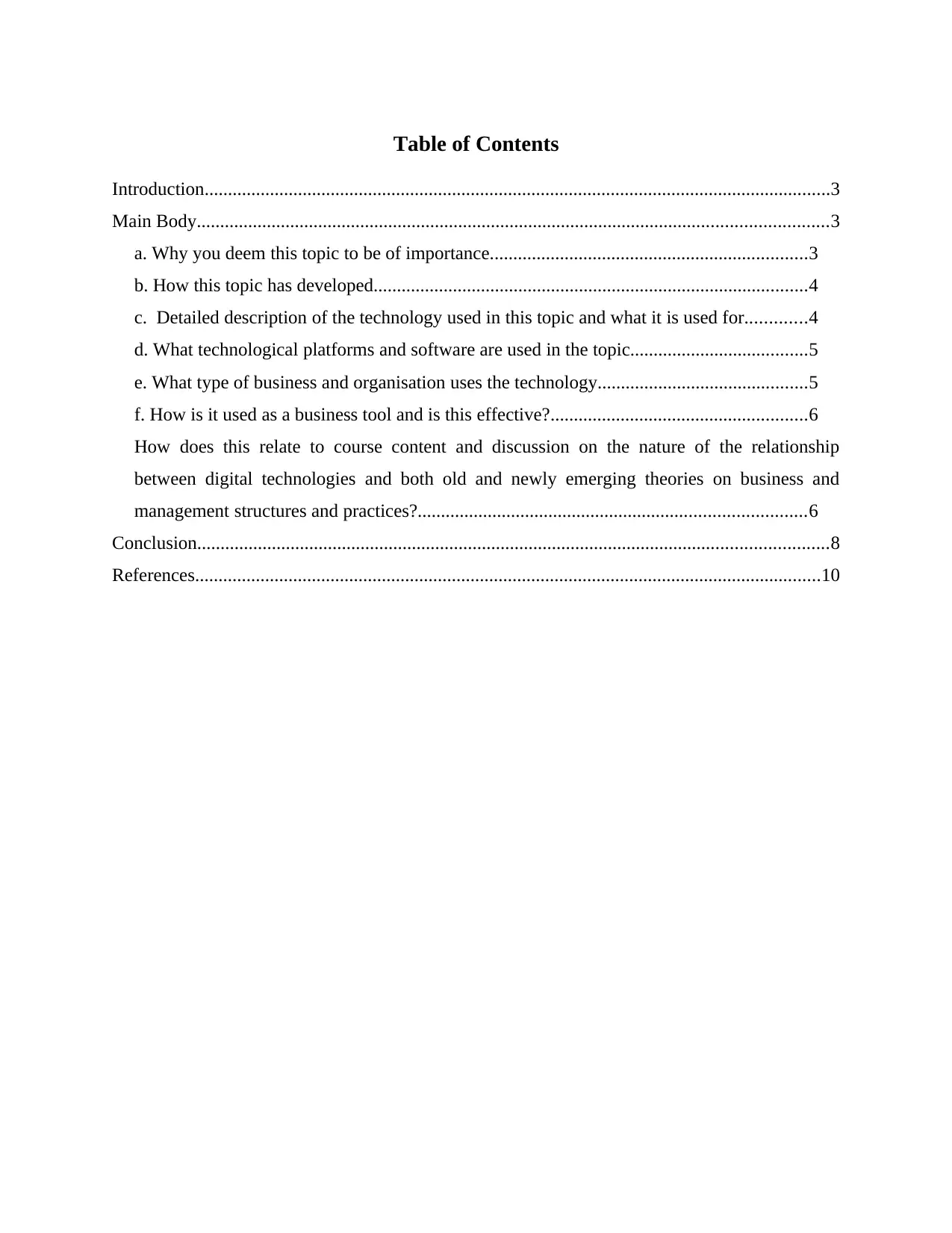
Table of Contents
Introduction......................................................................................................................................3
Main Body.......................................................................................................................................3
a. Why you deem this topic to be of importance....................................................................3
b. How this topic has developed.............................................................................................4
c. Detailed description of the technology used in this topic and what it is used for.............4
d. What technological platforms and software are used in the topic......................................5
e. What type of business and organisation uses the technology.............................................5
f. How is it used as a business tool and is this effective?.......................................................6
How does this relate to course content and discussion on the nature of the relationship
between digital technologies and both old and newly emerging theories on business and
management structures and practices?...................................................................................6
Conclusion.......................................................................................................................................8
References......................................................................................................................................10
Introduction......................................................................................................................................3
Main Body.......................................................................................................................................3
a. Why you deem this topic to be of importance....................................................................3
b. How this topic has developed.............................................................................................4
c. Detailed description of the technology used in this topic and what it is used for.............4
d. What technological platforms and software are used in the topic......................................5
e. What type of business and organisation uses the technology.............................................5
f. How is it used as a business tool and is this effective?.......................................................6
How does this relate to course content and discussion on the nature of the relationship
between digital technologies and both old and newly emerging theories on business and
management structures and practices?...................................................................................6
Conclusion.......................................................................................................................................8
References......................................................................................................................................10
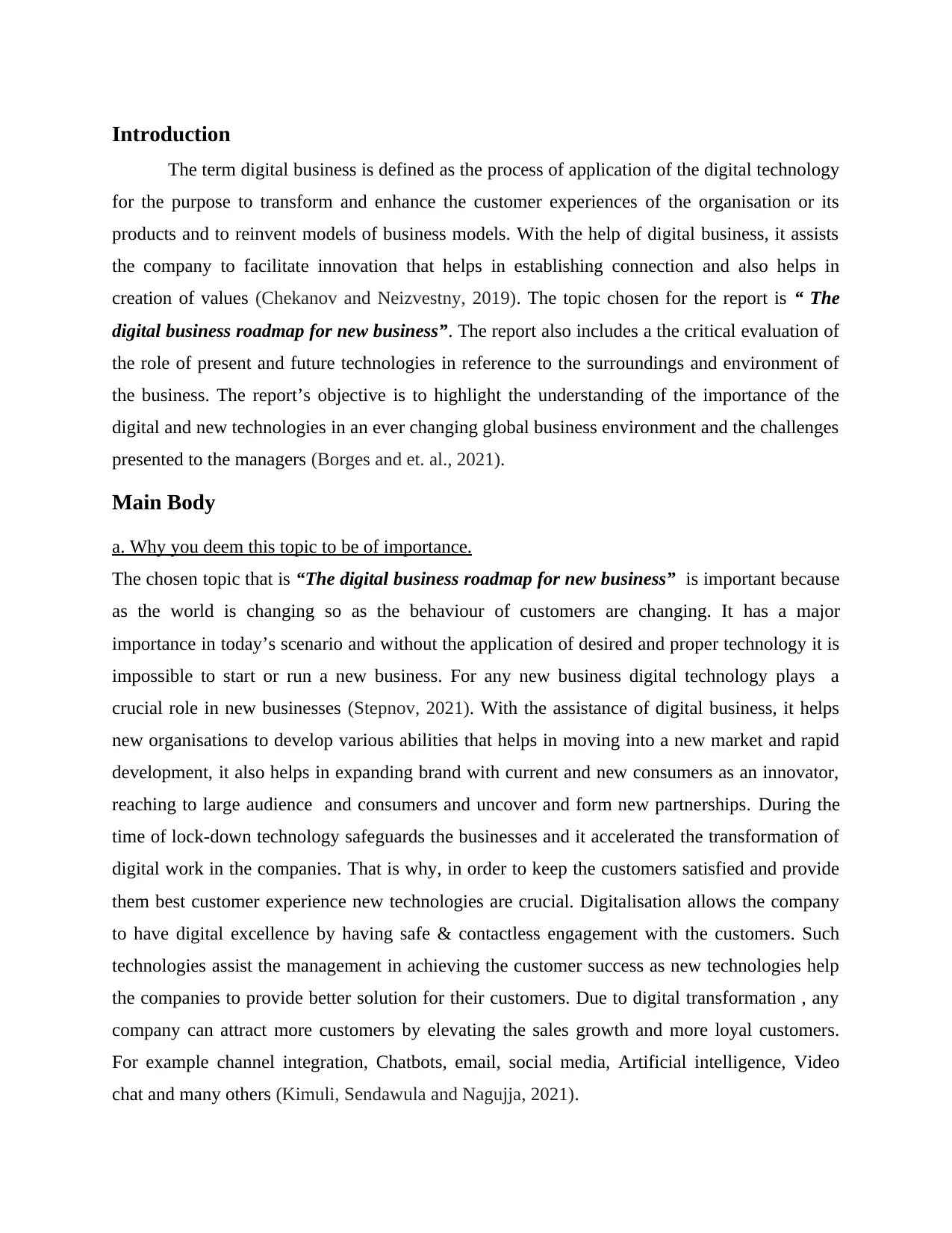
Introduction
The term digital business is defined as the process of application of the digital technology
for the purpose to transform and enhance the customer experiences of the organisation or its
products and to reinvent models of business models. With the help of digital business, it assists
the company to facilitate innovation that helps in establishing connection and also helps in
creation of values (Chekanov and Neizvestny, 2019). The topic chosen for the report is “ The
digital business roadmap for new business”. The report also includes a the critical evaluation of
the role of present and future technologies in reference to the surroundings and environment of
the business. The report’s objective is to highlight the understanding of the importance of the
digital and new technologies in an ever changing global business environment and the challenges
presented to the managers (Borges and et. al., 2021).
Main Body
a. Why you deem this topic to be of importance.
The chosen topic that is “The digital business roadmap for new business” is important because
as the world is changing so as the behaviour of customers are changing. It has a major
importance in today’s scenario and without the application of desired and proper technology it is
impossible to start or run a new business. For any new business digital technology plays a
crucial role in new businesses (Stepnov, 2021). With the assistance of digital business, it helps
new organisations to develop various abilities that helps in moving into a new market and rapid
development, it also helps in expanding brand with current and new consumers as an innovator,
reaching to large audience and consumers and uncover and form new partnerships. During the
time of lock-down technology safeguards the businesses and it accelerated the transformation of
digital work in the companies. That is why, in order to keep the customers satisfied and provide
them best customer experience new technologies are crucial. Digitalisation allows the company
to have digital excellence by having safe & contactless engagement with the customers. Such
technologies assist the management in achieving the customer success as new technologies help
the companies to provide better solution for their customers. Due to digital transformation , any
company can attract more customers by elevating the sales growth and more loyal customers.
For example channel integration, Chatbots, email, social media, Artificial intelligence, Video
chat and many others (Kimuli, Sendawula and Nagujja, 2021).
The term digital business is defined as the process of application of the digital technology
for the purpose to transform and enhance the customer experiences of the organisation or its
products and to reinvent models of business models. With the help of digital business, it assists
the company to facilitate innovation that helps in establishing connection and also helps in
creation of values (Chekanov and Neizvestny, 2019). The topic chosen for the report is “ The
digital business roadmap for new business”. The report also includes a the critical evaluation of
the role of present and future technologies in reference to the surroundings and environment of
the business. The report’s objective is to highlight the understanding of the importance of the
digital and new technologies in an ever changing global business environment and the challenges
presented to the managers (Borges and et. al., 2021).
Main Body
a. Why you deem this topic to be of importance.
The chosen topic that is “The digital business roadmap for new business” is important because
as the world is changing so as the behaviour of customers are changing. It has a major
importance in today’s scenario and without the application of desired and proper technology it is
impossible to start or run a new business. For any new business digital technology plays a
crucial role in new businesses (Stepnov, 2021). With the assistance of digital business, it helps
new organisations to develop various abilities that helps in moving into a new market and rapid
development, it also helps in expanding brand with current and new consumers as an innovator,
reaching to large audience and consumers and uncover and form new partnerships. During the
time of lock-down technology safeguards the businesses and it accelerated the transformation of
digital work in the companies. That is why, in order to keep the customers satisfied and provide
them best customer experience new technologies are crucial. Digitalisation allows the company
to have digital excellence by having safe & contactless engagement with the customers. Such
technologies assist the management in achieving the customer success as new technologies help
the companies to provide better solution for their customers. Due to digital transformation , any
company can attract more customers by elevating the sales growth and more loyal customers.
For example channel integration, Chatbots, email, social media, Artificial intelligence, Video
chat and many others (Kimuli, Sendawula and Nagujja, 2021).
⊘ This is a preview!⊘
Do you want full access?
Subscribe today to unlock all pages.

Trusted by 1+ million students worldwide
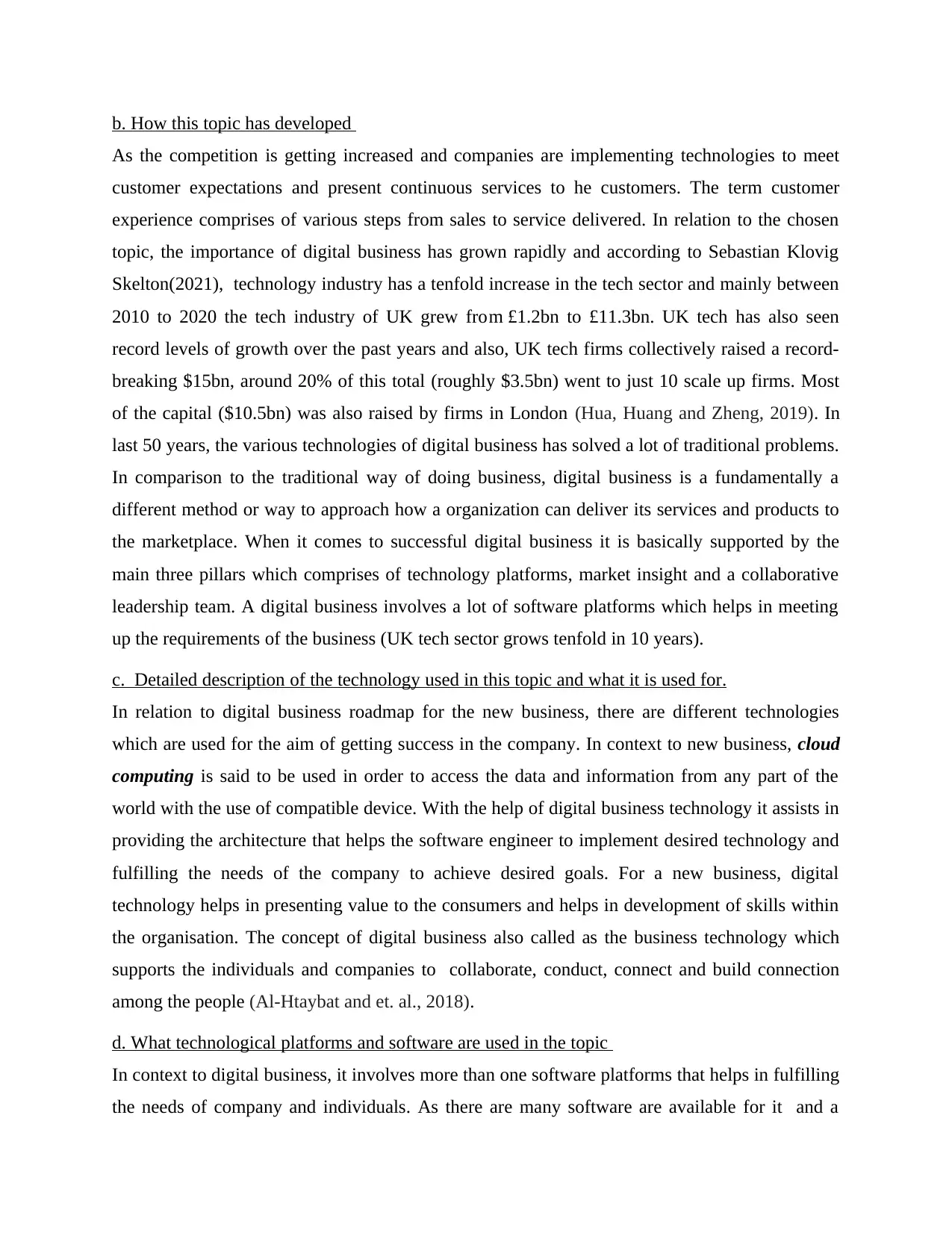
b. How this topic has developed
As the competition is getting increased and companies are implementing technologies to meet
customer expectations and present continuous services to he customers. The term customer
experience comprises of various steps from sales to service delivered. In relation to the chosen
topic, the importance of digital business has grown rapidly and according to Sebastian Klovig
Skelton(2021), technology industry has a tenfold increase in the tech sector and mainly between
2010 to 2020 the tech industry of UK grew from £1.2bn to £11.3bn. UK tech has also seen
record levels of growth over the past years and also, UK tech firms collectively raised a record-
breaking $15bn, around 20% of this total (roughly $3.5bn) went to just 10 scale up firms. Most
of the capital ($10.5bn) was also raised by firms in London (Hua, Huang and Zheng, 2019). In
last 50 years, the various technologies of digital business has solved a lot of traditional problems.
In comparison to the traditional way of doing business, digital business is a fundamentally a
different method or way to approach how a organization can deliver its services and products to
the marketplace. When it comes to successful digital business it is basically supported by the
main three pillars which comprises of technology platforms, market insight and a collaborative
leadership team. A digital business involves a lot of software platforms which helps in meeting
up the requirements of the business (UK tech sector grows tenfold in 10 years).
c. Detailed description of the technology used in this topic and what it is used for.
In relation to digital business roadmap for the new business, there are different technologies
which are used for the aim of getting success in the company. In context to new business, cloud
computing is said to be used in order to access the data and information from any part of the
world with the use of compatible device. With the help of digital business technology it assists in
providing the architecture that helps the software engineer to implement desired technology and
fulfilling the needs of the company to achieve desired goals. For a new business, digital
technology helps in presenting value to the consumers and helps in development of skills within
the organisation. The concept of digital business also called as the business technology which
supports the individuals and companies to collaborate, conduct, connect and build connection
among the people (Al-Htaybat and et. al., 2018).
d. What technological platforms and software are used in the topic
In context to digital business, it involves more than one software platforms that helps in fulfilling
the needs of company and individuals. As there are many software are available for it and a
As the competition is getting increased and companies are implementing technologies to meet
customer expectations and present continuous services to he customers. The term customer
experience comprises of various steps from sales to service delivered. In relation to the chosen
topic, the importance of digital business has grown rapidly and according to Sebastian Klovig
Skelton(2021), technology industry has a tenfold increase in the tech sector and mainly between
2010 to 2020 the tech industry of UK grew from £1.2bn to £11.3bn. UK tech has also seen
record levels of growth over the past years and also, UK tech firms collectively raised a record-
breaking $15bn, around 20% of this total (roughly $3.5bn) went to just 10 scale up firms. Most
of the capital ($10.5bn) was also raised by firms in London (Hua, Huang and Zheng, 2019). In
last 50 years, the various technologies of digital business has solved a lot of traditional problems.
In comparison to the traditional way of doing business, digital business is a fundamentally a
different method or way to approach how a organization can deliver its services and products to
the marketplace. When it comes to successful digital business it is basically supported by the
main three pillars which comprises of technology platforms, market insight and a collaborative
leadership team. A digital business involves a lot of software platforms which helps in meeting
up the requirements of the business (UK tech sector grows tenfold in 10 years).
c. Detailed description of the technology used in this topic and what it is used for.
In relation to digital business roadmap for the new business, there are different technologies
which are used for the aim of getting success in the company. In context to new business, cloud
computing is said to be used in order to access the data and information from any part of the
world with the use of compatible device. With the help of digital business technology it assists in
providing the architecture that helps the software engineer to implement desired technology and
fulfilling the needs of the company to achieve desired goals. For a new business, digital
technology helps in presenting value to the consumers and helps in development of skills within
the organisation. The concept of digital business also called as the business technology which
supports the individuals and companies to collaborate, conduct, connect and build connection
among the people (Al-Htaybat and et. al., 2018).
d. What technological platforms and software are used in the topic
In context to digital business, it involves more than one software platforms that helps in fulfilling
the needs of company and individuals. As there are many software are available for it and a
Paraphrase This Document
Need a fresh take? Get an instant paraphrase of this document with our AI Paraphraser
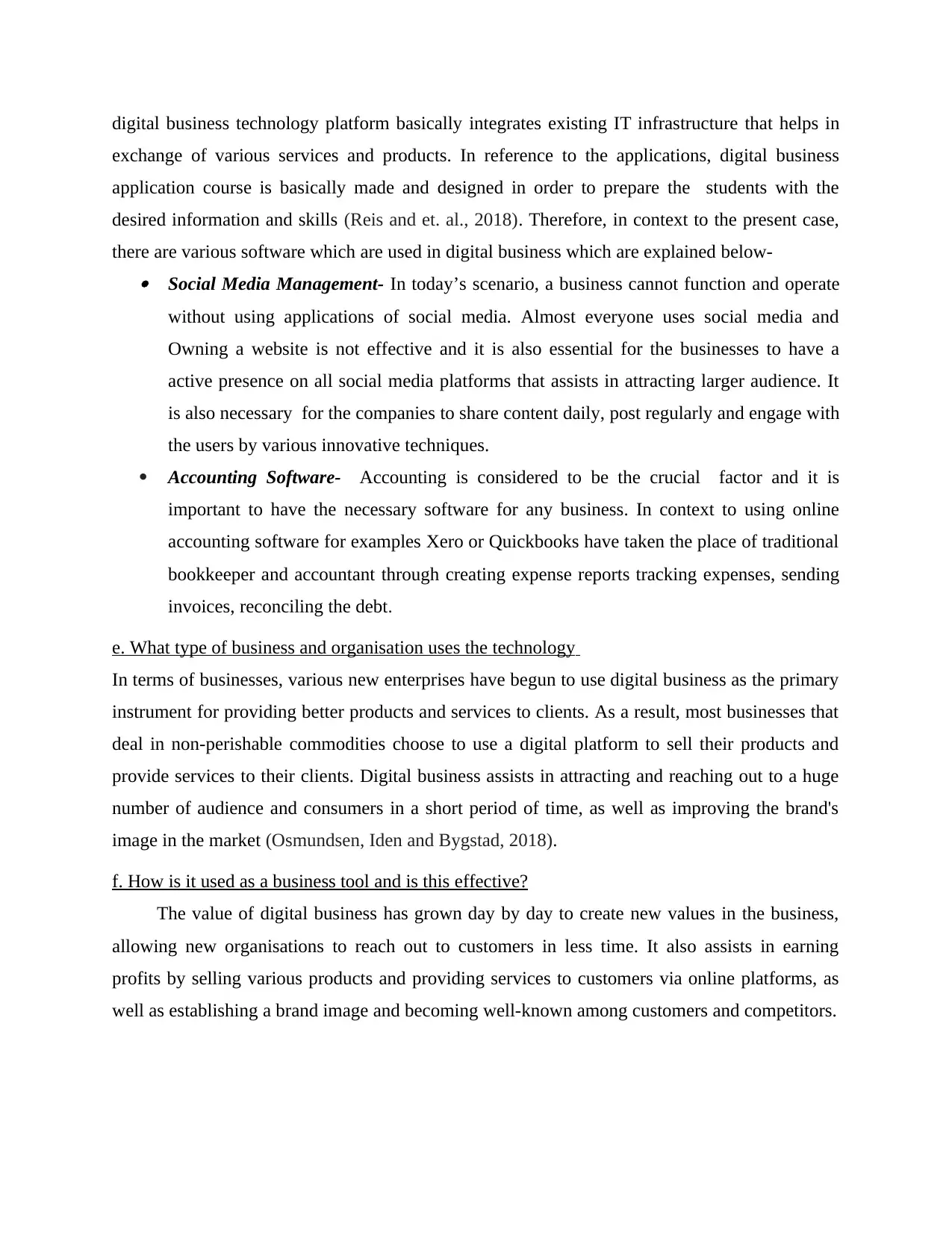
digital business technology platform basically integrates existing IT infrastructure that helps in
exchange of various services and products. In reference to the applications, digital business
application course is basically made and designed in order to prepare the students with the
desired information and skills (Reis and et. al., 2018). Therefore, in context to the present case,
there are various software which are used in digital business which are explained below- Social Media Management- In today’s scenario, a business cannot function and operate
without using applications of social media. Almost everyone uses social media and
Owning a website is not effective and it is also essential for the businesses to have a
active presence on all social media platforms that assists in attracting larger audience. It
is also necessary for the companies to share content daily, post regularly and engage with
the users by various innovative techniques.
Accounting Software- Accounting is considered to be the crucial factor and it is
important to have the necessary software for any business. In context to using online
accounting software for examples Xero or Quickbooks have taken the place of traditional
bookkeeper and accountant through creating expense reports tracking expenses, sending
invoices, reconciling the debt.
e. What type of business and organisation uses the technology
In terms of businesses, various new enterprises have begun to use digital business as the primary
instrument for providing better products and services to clients. As a result, most businesses that
deal in non-perishable commodities choose to use a digital platform to sell their products and
provide services to their clients. Digital business assists in attracting and reaching out to a huge
number of audience and consumers in a short period of time, as well as improving the brand's
image in the market (Osmundsen, Iden and Bygstad, 2018).
f. How is it used as a business tool and is this effective?
The value of digital business has grown day by day to create new values in the business,
allowing new organisations to reach out to customers in less time. It also assists in earning
profits by selling various products and providing services to customers via online platforms, as
well as establishing a brand image and becoming well-known among customers and competitors.
exchange of various services and products. In reference to the applications, digital business
application course is basically made and designed in order to prepare the students with the
desired information and skills (Reis and et. al., 2018). Therefore, in context to the present case,
there are various software which are used in digital business which are explained below- Social Media Management- In today’s scenario, a business cannot function and operate
without using applications of social media. Almost everyone uses social media and
Owning a website is not effective and it is also essential for the businesses to have a
active presence on all social media platforms that assists in attracting larger audience. It
is also necessary for the companies to share content daily, post regularly and engage with
the users by various innovative techniques.
Accounting Software- Accounting is considered to be the crucial factor and it is
important to have the necessary software for any business. In context to using online
accounting software for examples Xero or Quickbooks have taken the place of traditional
bookkeeper and accountant through creating expense reports tracking expenses, sending
invoices, reconciling the debt.
e. What type of business and organisation uses the technology
In terms of businesses, various new enterprises have begun to use digital business as the primary
instrument for providing better products and services to clients. As a result, most businesses that
deal in non-perishable commodities choose to use a digital platform to sell their products and
provide services to their clients. Digital business assists in attracting and reaching out to a huge
number of audience and consumers in a short period of time, as well as improving the brand's
image in the market (Osmundsen, Iden and Bygstad, 2018).
f. How is it used as a business tool and is this effective?
The value of digital business has grown day by day to create new values in the business,
allowing new organisations to reach out to customers in less time. It also assists in earning
profits by selling various products and providing services to customers via online platforms, as
well as establishing a brand image and becoming well-known among customers and competitors.
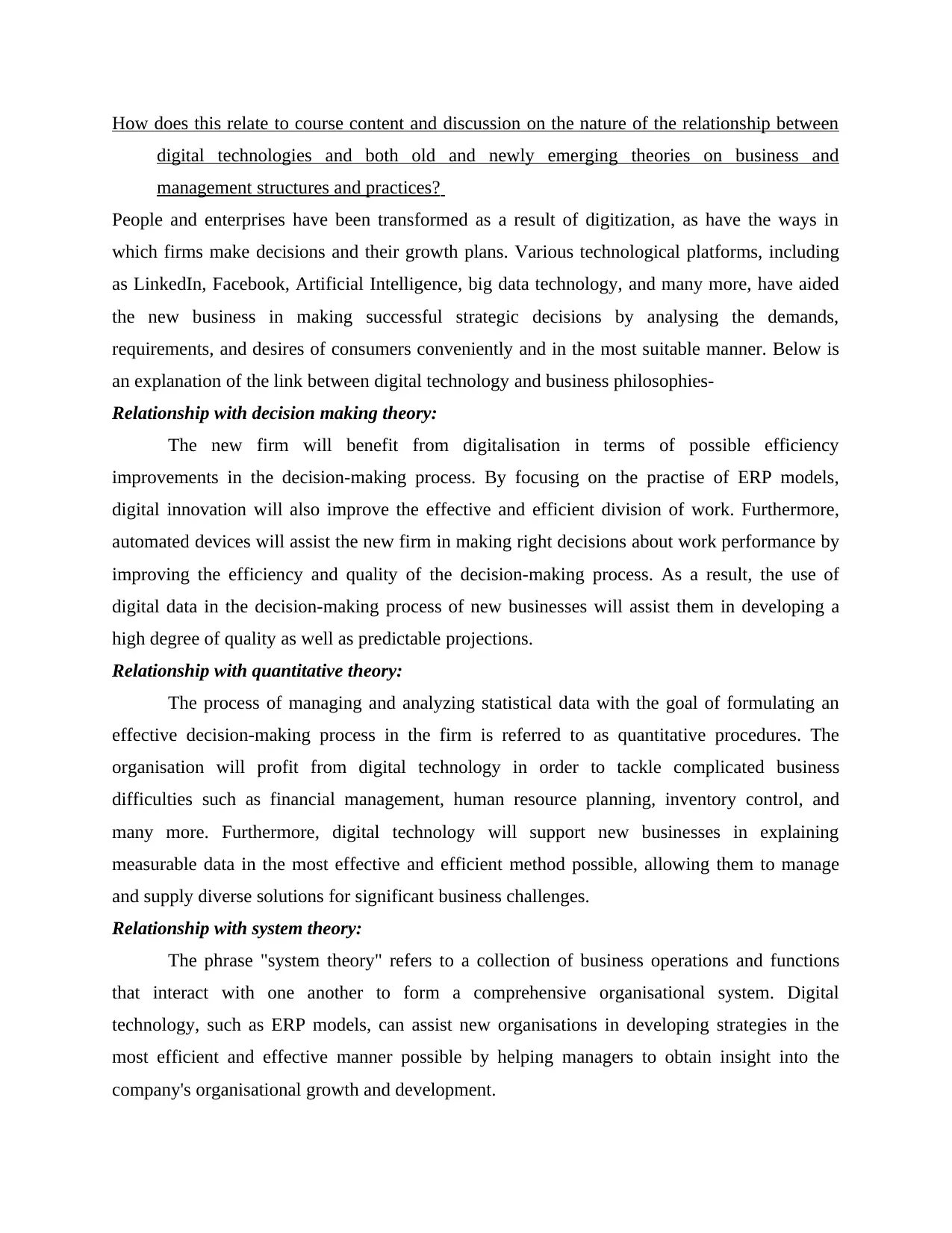
How does this relate to course content and discussion on the nature of the relationship between
digital technologies and both old and newly emerging theories on business and
management structures and practices?
People and enterprises have been transformed as a result of digitization, as have the ways in
which firms make decisions and their growth plans. Various technological platforms, including
as LinkedIn, Facebook, Artificial Intelligence, big data technology, and many more, have aided
the new business in making successful strategic decisions by analysing the demands,
requirements, and desires of consumers conveniently and in the most suitable manner. Below is
an explanation of the link between digital technology and business philosophies-
Relationship with decision making theory:
The new firm will benefit from digitalisation in terms of possible efficiency
improvements in the decision-making process. By focusing on the practise of ERP models,
digital innovation will also improve the effective and efficient division of work. Furthermore,
automated devices will assist the new firm in making right decisions about work performance by
improving the efficiency and quality of the decision-making process. As a result, the use of
digital data in the decision-making process of new businesses will assist them in developing a
high degree of quality as well as predictable projections.
Relationship with quantitative theory:
The process of managing and analyzing statistical data with the goal of formulating an
effective decision-making process in the firm is referred to as quantitative procedures. The
organisation will profit from digital technology in order to tackle complicated business
difficulties such as financial management, human resource planning, inventory control, and
many more. Furthermore, digital technology will support new businesses in explaining
measurable data in the most effective and efficient method possible, allowing them to manage
and supply diverse solutions for significant business challenges.
Relationship with system theory:
The phrase "system theory" refers to a collection of business operations and functions
that interact with one another to form a comprehensive organisational system. Digital
technology, such as ERP models, can assist new organisations in developing strategies in the
most efficient and effective manner possible by helping managers to obtain insight into the
company's organisational growth and development.
digital technologies and both old and newly emerging theories on business and
management structures and practices?
People and enterprises have been transformed as a result of digitization, as have the ways in
which firms make decisions and their growth plans. Various technological platforms, including
as LinkedIn, Facebook, Artificial Intelligence, big data technology, and many more, have aided
the new business in making successful strategic decisions by analysing the demands,
requirements, and desires of consumers conveniently and in the most suitable manner. Below is
an explanation of the link between digital technology and business philosophies-
Relationship with decision making theory:
The new firm will benefit from digitalisation in terms of possible efficiency
improvements in the decision-making process. By focusing on the practise of ERP models,
digital innovation will also improve the effective and efficient division of work. Furthermore,
automated devices will assist the new firm in making right decisions about work performance by
improving the efficiency and quality of the decision-making process. As a result, the use of
digital data in the decision-making process of new businesses will assist them in developing a
high degree of quality as well as predictable projections.
Relationship with quantitative theory:
The process of managing and analyzing statistical data with the goal of formulating an
effective decision-making process in the firm is referred to as quantitative procedures. The
organisation will profit from digital technology in order to tackle complicated business
difficulties such as financial management, human resource planning, inventory control, and
many more. Furthermore, digital technology will support new businesses in explaining
measurable data in the most effective and efficient method possible, allowing them to manage
and supply diverse solutions for significant business challenges.
Relationship with system theory:
The phrase "system theory" refers to a collection of business operations and functions
that interact with one another to form a comprehensive organisational system. Digital
technology, such as ERP models, can assist new organisations in developing strategies in the
most efficient and effective manner possible by helping managers to obtain insight into the
company's organisational growth and development.
⊘ This is a preview!⊘
Do you want full access?
Subscribe today to unlock all pages.

Trusted by 1+ million students worldwide
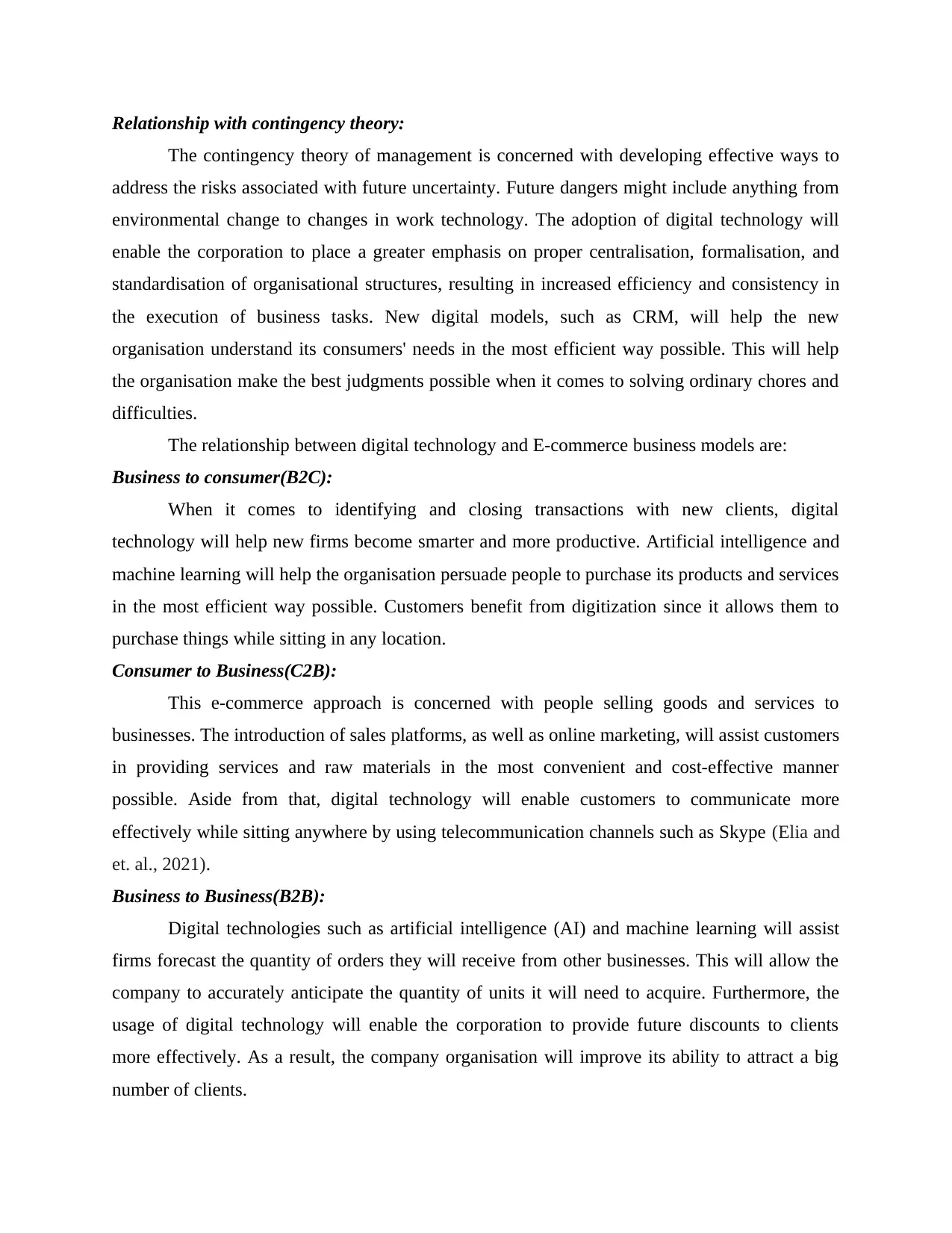
Relationship with contingency theory:
The contingency theory of management is concerned with developing effective ways to
address the risks associated with future uncertainty. Future dangers might include anything from
environmental change to changes in work technology. The adoption of digital technology will
enable the corporation to place a greater emphasis on proper centralisation, formalisation, and
standardisation of organisational structures, resulting in increased efficiency and consistency in
the execution of business tasks. New digital models, such as CRM, will help the new
organisation understand its consumers' needs in the most efficient way possible. This will help
the organisation make the best judgments possible when it comes to solving ordinary chores and
difficulties.
The relationship between digital technology and E-commerce business models are:
Business to consumer(B2C):
When it comes to identifying and closing transactions with new clients, digital
technology will help new firms become smarter and more productive. Artificial intelligence and
machine learning will help the organisation persuade people to purchase its products and services
in the most efficient way possible. Customers benefit from digitization since it allows them to
purchase things while sitting in any location.
Consumer to Business(C2B):
This e-commerce approach is concerned with people selling goods and services to
businesses. The introduction of sales platforms, as well as online marketing, will assist customers
in providing services and raw materials in the most convenient and cost-effective manner
possible. Aside from that, digital technology will enable customers to communicate more
effectively while sitting anywhere by using telecommunication channels such as Skype (Elia and
et. al., 2021).
Business to Business(B2B):
Digital technologies such as artificial intelligence (AI) and machine learning will assist
firms forecast the quantity of orders they will receive from other businesses. This will allow the
company to accurately anticipate the quantity of units it will need to acquire. Furthermore, the
usage of digital technology will enable the corporation to provide future discounts to clients
more effectively. As a result, the company organisation will improve its ability to attract a big
number of clients.
The contingency theory of management is concerned with developing effective ways to
address the risks associated with future uncertainty. Future dangers might include anything from
environmental change to changes in work technology. The adoption of digital technology will
enable the corporation to place a greater emphasis on proper centralisation, formalisation, and
standardisation of organisational structures, resulting in increased efficiency and consistency in
the execution of business tasks. New digital models, such as CRM, will help the new
organisation understand its consumers' needs in the most efficient way possible. This will help
the organisation make the best judgments possible when it comes to solving ordinary chores and
difficulties.
The relationship between digital technology and E-commerce business models are:
Business to consumer(B2C):
When it comes to identifying and closing transactions with new clients, digital
technology will help new firms become smarter and more productive. Artificial intelligence and
machine learning will help the organisation persuade people to purchase its products and services
in the most efficient way possible. Customers benefit from digitization since it allows them to
purchase things while sitting in any location.
Consumer to Business(C2B):
This e-commerce approach is concerned with people selling goods and services to
businesses. The introduction of sales platforms, as well as online marketing, will assist customers
in providing services and raw materials in the most convenient and cost-effective manner
possible. Aside from that, digital technology will enable customers to communicate more
effectively while sitting anywhere by using telecommunication channels such as Skype (Elia and
et. al., 2021).
Business to Business(B2B):
Digital technologies such as artificial intelligence (AI) and machine learning will assist
firms forecast the quantity of orders they will receive from other businesses. This will allow the
company to accurately anticipate the quantity of units it will need to acquire. Furthermore, the
usage of digital technology will enable the corporation to provide future discounts to clients
more effectively. As a result, the company organisation will improve its ability to attract a big
number of clients.
Paraphrase This Document
Need a fresh take? Get an instant paraphrase of this document with our AI Paraphraser
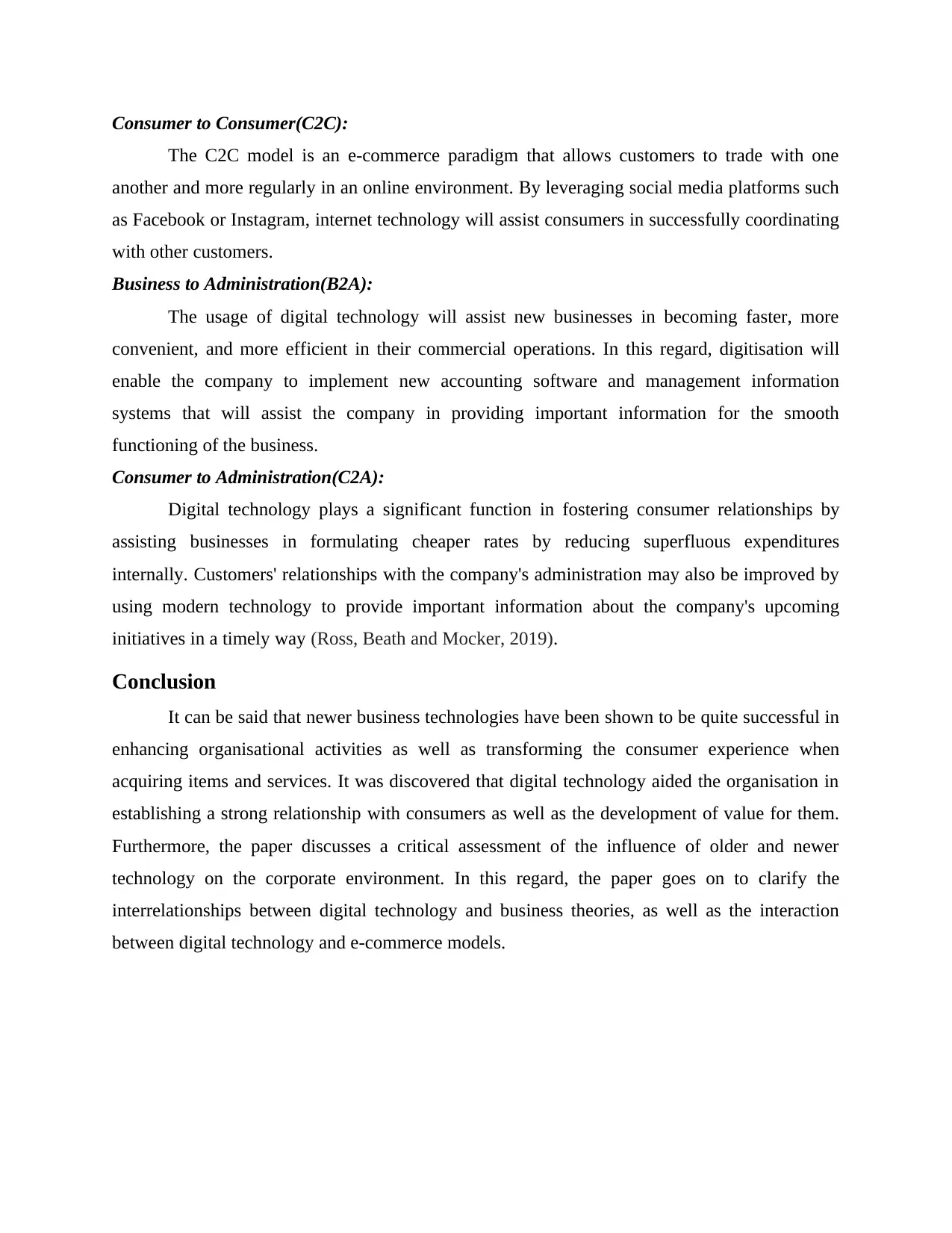
Consumer to Consumer(C2C):
The C2C model is an e-commerce paradigm that allows customers to trade with one
another and more regularly in an online environment. By leveraging social media platforms such
as Facebook or Instagram, internet technology will assist consumers in successfully coordinating
with other customers.
Business to Administration(B2A):
The usage of digital technology will assist new businesses in becoming faster, more
convenient, and more efficient in their commercial operations. In this regard, digitisation will
enable the company to implement new accounting software and management information
systems that will assist the company in providing important information for the smooth
functioning of the business.
Consumer to Administration(C2A):
Digital technology plays a significant function in fostering consumer relationships by
assisting businesses in formulating cheaper rates by reducing superfluous expenditures
internally. Customers' relationships with the company's administration may also be improved by
using modern technology to provide important information about the company's upcoming
initiatives in a timely way (Ross, Beath and Mocker, 2019).
Conclusion
It can be said that newer business technologies have been shown to be quite successful in
enhancing organisational activities as well as transforming the consumer experience when
acquiring items and services. It was discovered that digital technology aided the organisation in
establishing a strong relationship with consumers as well as the development of value for them.
Furthermore, the paper discusses a critical assessment of the influence of older and newer
technology on the corporate environment. In this regard, the paper goes on to clarify the
interrelationships between digital technology and business theories, as well as the interaction
between digital technology and e-commerce models.
The C2C model is an e-commerce paradigm that allows customers to trade with one
another and more regularly in an online environment. By leveraging social media platforms such
as Facebook or Instagram, internet technology will assist consumers in successfully coordinating
with other customers.
Business to Administration(B2A):
The usage of digital technology will assist new businesses in becoming faster, more
convenient, and more efficient in their commercial operations. In this regard, digitisation will
enable the company to implement new accounting software and management information
systems that will assist the company in providing important information for the smooth
functioning of the business.
Consumer to Administration(C2A):
Digital technology plays a significant function in fostering consumer relationships by
assisting businesses in formulating cheaper rates by reducing superfluous expenditures
internally. Customers' relationships with the company's administration may also be improved by
using modern technology to provide important information about the company's upcoming
initiatives in a timely way (Ross, Beath and Mocker, 2019).
Conclusion
It can be said that newer business technologies have been shown to be quite successful in
enhancing organisational activities as well as transforming the consumer experience when
acquiring items and services. It was discovered that digital technology aided the organisation in
establishing a strong relationship with consumers as well as the development of value for them.
Furthermore, the paper discusses a critical assessment of the influence of older and newer
technology on the corporate environment. In this regard, the paper goes on to clarify the
interrelationships between digital technology and business theories, as well as the interaction
between digital technology and e-commerce models.
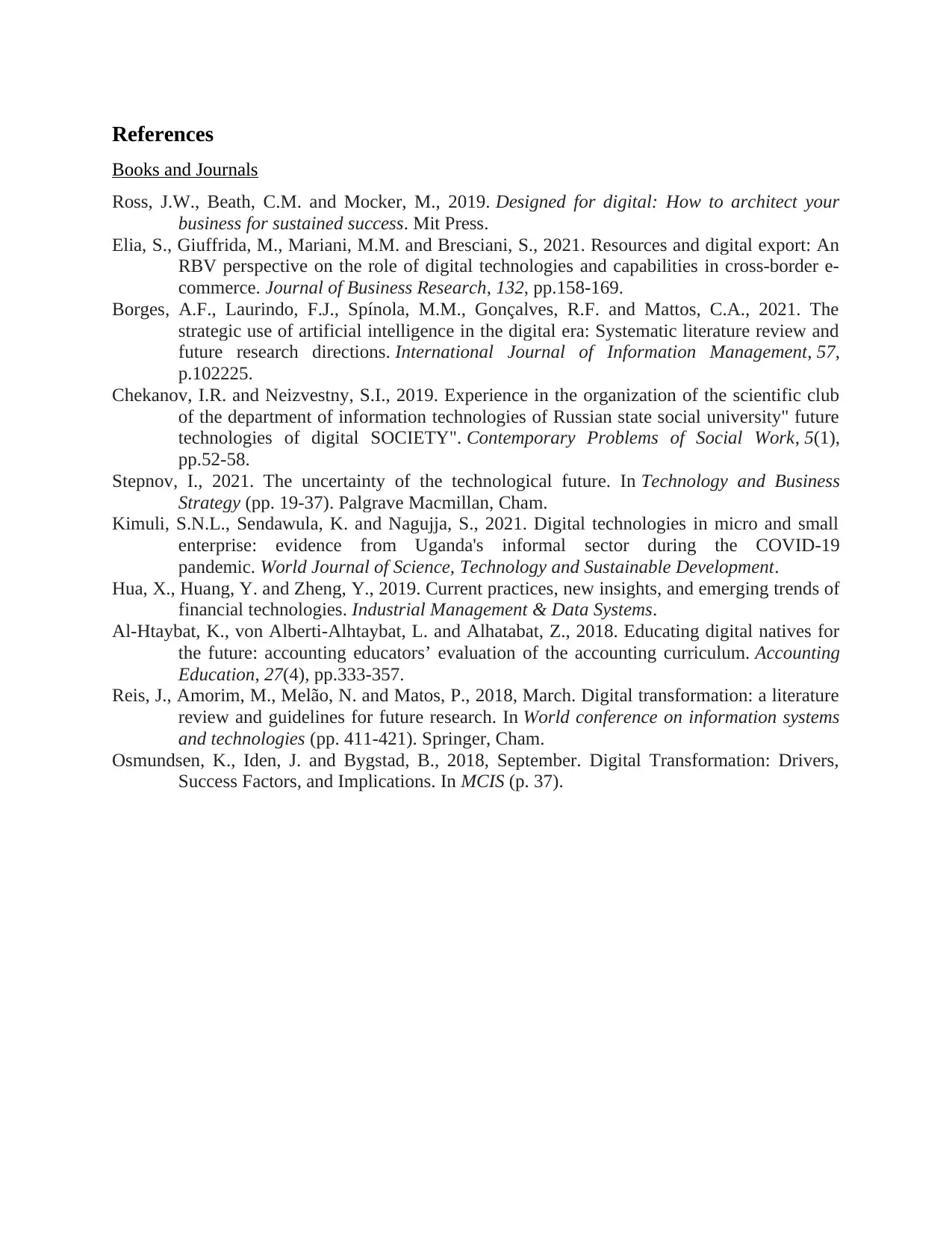
References
Books and Journals
Ross, J.W., Beath, C.M. and Mocker, M., 2019. Designed for digital: How to architect your
business for sustained success. Mit Press.
Elia, S., Giuffrida, M., Mariani, M.M. and Bresciani, S., 2021. Resources and digital export: An
RBV perspective on the role of digital technologies and capabilities in cross-border e-
commerce. Journal of Business Research, 132, pp.158-169.
Borges, A.F., Laurindo, F.J., Spínola, M.M., Gonçalves, R.F. and Mattos, C.A., 2021. The
strategic use of artificial intelligence in the digital era: Systematic literature review and
future research directions. International Journal of Information Management, 57,
p.102225.
Chekanov, I.R. and Neizvestny, S.I., 2019. Experience in the organization of the scientific club
of the department of information technologies of Russian state social university" future
technologies of digital SOCIETY". Contemporary Problems of Social Work, 5(1),
pp.52-58.
Stepnov, I., 2021. The uncertainty of the technological future. In Technology and Business
Strategy (pp. 19-37). Palgrave Macmillan, Cham.
Kimuli, S.N.L., Sendawula, K. and Nagujja, S., 2021. Digital technologies in micro and small
enterprise: evidence from Uganda's informal sector during the COVID-19
pandemic. World Journal of Science, Technology and Sustainable Development.
Hua, X., Huang, Y. and Zheng, Y., 2019. Current practices, new insights, and emerging trends of
financial technologies. Industrial Management & Data Systems.
Al-Htaybat, K., von Alberti-Alhtaybat, L. and Alhatabat, Z., 2018. Educating digital natives for
the future: accounting educators’ evaluation of the accounting curriculum. Accounting
Education, 27(4), pp.333-357.
Reis, J., Amorim, M., Melão, N. and Matos, P., 2018, March. Digital transformation: a literature
review and guidelines for future research. In World conference on information systems
and technologies (pp. 411-421). Springer, Cham.
Osmundsen, K., Iden, J. and Bygstad, B., 2018, September. Digital Transformation: Drivers,
Success Factors, and Implications. In MCIS (p. 37).
Books and Journals
Ross, J.W., Beath, C.M. and Mocker, M., 2019. Designed for digital: How to architect your
business for sustained success. Mit Press.
Elia, S., Giuffrida, M., Mariani, M.M. and Bresciani, S., 2021. Resources and digital export: An
RBV perspective on the role of digital technologies and capabilities in cross-border e-
commerce. Journal of Business Research, 132, pp.158-169.
Borges, A.F., Laurindo, F.J., Spínola, M.M., Gonçalves, R.F. and Mattos, C.A., 2021. The
strategic use of artificial intelligence in the digital era: Systematic literature review and
future research directions. International Journal of Information Management, 57,
p.102225.
Chekanov, I.R. and Neizvestny, S.I., 2019. Experience in the organization of the scientific club
of the department of information technologies of Russian state social university" future
technologies of digital SOCIETY". Contemporary Problems of Social Work, 5(1),
pp.52-58.
Stepnov, I., 2021. The uncertainty of the technological future. In Technology and Business
Strategy (pp. 19-37). Palgrave Macmillan, Cham.
Kimuli, S.N.L., Sendawula, K. and Nagujja, S., 2021. Digital technologies in micro and small
enterprise: evidence from Uganda's informal sector during the COVID-19
pandemic. World Journal of Science, Technology and Sustainable Development.
Hua, X., Huang, Y. and Zheng, Y., 2019. Current practices, new insights, and emerging trends of
financial technologies. Industrial Management & Data Systems.
Al-Htaybat, K., von Alberti-Alhtaybat, L. and Alhatabat, Z., 2018. Educating digital natives for
the future: accounting educators’ evaluation of the accounting curriculum. Accounting
Education, 27(4), pp.333-357.
Reis, J., Amorim, M., Melão, N. and Matos, P., 2018, March. Digital transformation: a literature
review and guidelines for future research. In World conference on information systems
and technologies (pp. 411-421). Springer, Cham.
Osmundsen, K., Iden, J. and Bygstad, B., 2018, September. Digital Transformation: Drivers,
Success Factors, and Implications. In MCIS (p. 37).
⊘ This is a preview!⊘
Do you want full access?
Subscribe today to unlock all pages.

Trusted by 1+ million students worldwide
1 out of 9
Related Documents
Your All-in-One AI-Powered Toolkit for Academic Success.
+13062052269
info@desklib.com
Available 24*7 on WhatsApp / Email
![[object Object]](/_next/static/media/star-bottom.7253800d.svg)
Unlock your academic potential
Copyright © 2020–2026 A2Z Services. All Rights Reserved. Developed and managed by ZUCOL.



